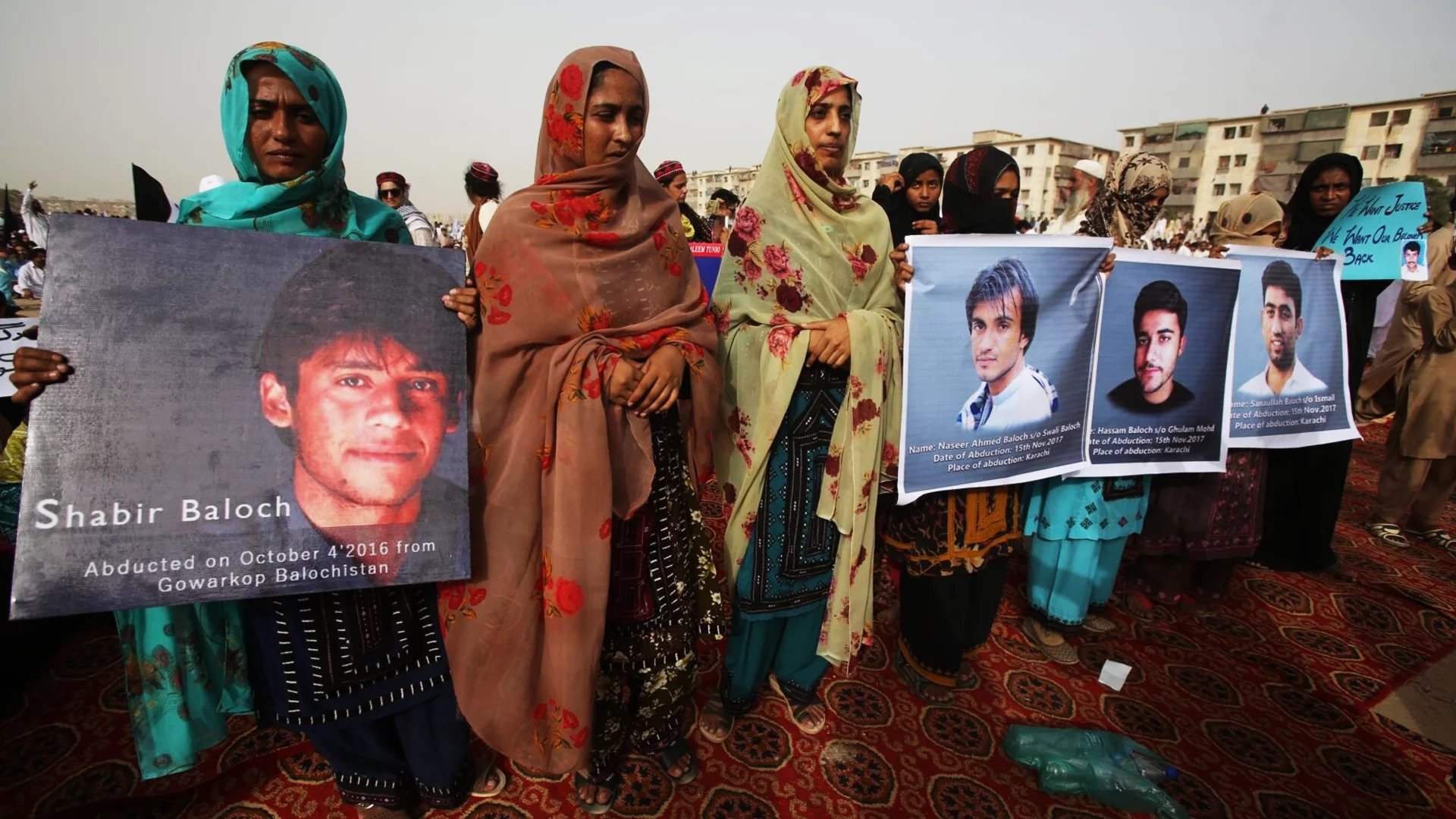In December 2021, an assistant sub-inspector stationed at Secretariat Police Station Islamabad asked students of the Quaid-e-Azam University (QAU), Islamabad, to collect personal data/information of their fellow Baloch students. Thereafter, in February 2022, a serving army officer, Major Ghulam Murtaza (belonging to Khuzdar Cantonment) approached Baloch students on the campus of QAU for data collection and broader intimidation of Baloch youth. Major Murtaza demanded a meeting with Baloch student, Hafeez Baloch, who was unable to comply due to his study workload. When Hafeez returned to his hometown, i.e. Khuzdar, he was forcibly disappeared on 8 February 2022, from a classroom full of students in broad daylight.
Information on his fate and whereabouts finally came to the fore on 30 March 2022 – Hafeez had been falsely implicated in a fake terrorism FIR, for which he faced trial and was eventually acquitted. Who will account for his time spent in jail facing a bogus trial – we have yet to see.
After Hafeez’s disappearance, several other Baloch students were disappeared. These disappearances were repeatedly brought to the attention of the Islamabad High Court in the connected writ petitions pending before it on racial profiling and enforced disappearances of Baloch students. On 28 April 2022, some plainclothes men in a white Vigo were recorded on camera abducting Baloch student, Beebagr Imdad, from the campus of Punjab University, where he was visiting his cousin, Salim Baloch. Salim was not only an eyewitness to Beebagr’s disappearance, but also took the brave step of becoming the petitioner before the Lahore High Court in a writ seeking production of his cousin. Over a year later, on 4 July 2023, Salim himself has been forcibly disappeared from Turbat.
Such is the life of Baloch students across the country. One student is released after an abduction but five more are abducted with no end in sight for this heinous practice. Feroz Baloch is one such student who was forcibly disappeared on 11 May 2022, while on his way to the library at Arid Agriculture University, Rawalpindi (where he is a student). There is no information on Feroz’s fate or whereabouts till date.
In light of the increasing disappearances of Baloch students (and impunity for the same), the Islamabad High Court, vide order dated 28 April 2022, directed the establishment of a Commission to inquire into the grievances of Baloch students and thereafter, submit its recommendations in the form of a report before the Court. In February 2023, the Akhtar Mengal led Baloch Students Commission submitted its report before the Islamabad High Court. On page 21 of the Report (in paragraph 47), the Secretary, Ministry of Defence was questioned regarding the presence of Major Murtaza on the campus of QAU. The relevant excerpt is produced here, as it reflects the degree of impunity and complete refusal within the Armed Forces to acknowledge that their behavior amounts to sheer thuggery: “The Commission was apprised that the complaint regarding meeting of an army officer with Baloch students at the campus of QAU was examined in detail and it transpired that the officer, who hailed from Khuzdar, Balochistan, interacted with the students in his personal capacity without any orders from his institution.”
One’s first impression reading this is the pressing question as to why no action has been taken against a serving military officer, who as per the Ministry of Defence’s own admission acted without orders? If the individual officers of the Armed Forces are so undisciplined that they arrive on university campuses to profile students belonging to a deprived province of their own accord, then God help Pakistan in a state of war.
Another important revelation in the report – particularly in the context of the suicide attack in Turbat by a woman belonging to the Baloch Liberation Army – is available on page 45 of the Commission Report (in paragraph 118). The excerpt provides: “Another person complained about the disappearances that occurred in his area, i.e. Tutak. He informed that in 2014, approximately 150-200 mutilated bodies were discovered from Tutak graves. He was afraid that some of the disappeared could be among those found dead in Tutak in 2014. It was plausible since the identity of the victims remained uncertain… He further said that the ordeal did not stop there as the security agencies again picked up sixteen people from his family, including sons, brothers and a seventy year old man and an eight year old child…”.
It is pertinent to mention here that the female suicide bomber, Sumaiya Qalandarani belonged to Tutak, Balochistan. A commission had been formed some years prior to inquire into the Tutak mass graves – that report has not been made public till date.
Commission after commission; case after case; inquiry after inquiry; false promise after false promise but the fate of Baloch youth has not changed – not even a little. The reason for this is fairly simple: the State of Pakistan continues to treat Balochistan as an occupied territory, rather than as part and parcel of the federation. Legitimate grievances of the Baloch people – relating to their right to life and dignity – have been neglected for decades while false promises of “development” have continuously been made as the State of Pakistan robs the Baloch people of their resources. What to speak of any development when it is impossible for the Baloch people to breathe or even exist on their own land, or anywhere else in the country.
Commission after commission; case after case; inquiry after inquiry; false promise after false promise but the fate of Baloch youth has not changed – not even a little. The reason for this is fairly simple: the State of Pakistan continues to treat Balochistan as an occupied territory, rather than as part and parcel of the Federation.
The specific and consistent targeting of unarmed and peaceful Baloch youth – who have actively chosen the pen over the gun – will only exacerbate the conflict and increase recruits for separatist groups. It would appear, however, that this is exactly what the Pakistan Army wants. For the simple reason that for as long as the conflict in Balochistan is alive, the military’s unending demands for a greater share in the country’s limited resources will find justification. It would, in fact, appear that the only beneficiary of the conflict in Balochistan is the Pakistan Army itself. There is no other rational explanation for the senseless targeting of Baloch youth over the decades – which is continuing with complete impunity.
Those tasked with defending Pakistan against external aggression must ensure that their internal aggression against Pakistan’s own citizens does not become a catalyst for this country breaking apart once again. When you leave people with nothing to lose, can we really be surprised that those people are pushed to take up arms? Where mutilated corpses, mass graves and constant humiliation by security forces are a norm, what path is the State forcing the Baloch people to take?

The writer is an Islamabad-based lawyer and human rights activist.

